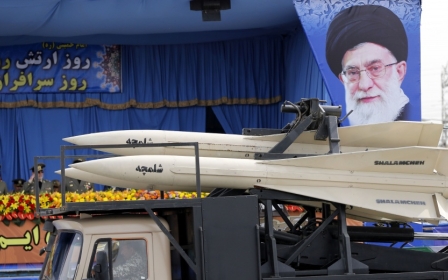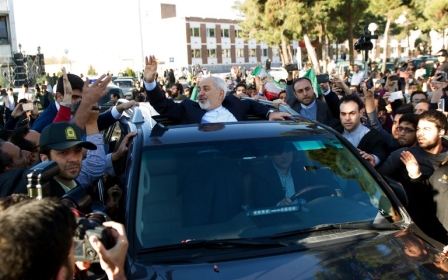Why didn't Ayatollah Khamenei support the Lausanne framework deal?

On the morning of 2 April, Iran’s Foreign Minister Mohammad Javad Zarif was the first to inform the world of an Iran nuclear framework agreement, tweeting, “Found solutions. Ready to start drafting immediately.”
Several minutes later, a joint statement was read at a press conference in Lausanne, Switzerland. The EU high representative, Federica Mogherini, read in English, while Javad Zarif did so in Farsi, both explaining the framework of the final nuclear agreement between Iran and the P5+1.
According to the statement, “there will be no other enrichment facility than Natanz,” “Fordow will be converted from an enrichment site into a nuclear, physics and technology centre,” and “the Heavy Water Research Reactor in Arak” will be redesigned and rebuilt so that it “will not produce weapons grade plutonium”. Furthermore, the two sides agreed to the “implementation of the modified Code 3.1 and provisional application of the additional protocol” of the International Atomic Eenergy Agency (IAEA) safeguards system.
Despite a week of optimism following the landmark deal, growing differences between Iran and the US cast doubt on the formulation of a final deal. Overshadowing the deal's success are two reports - one in Tehran, the other in Washington - that outline the outcome of the Lausanne agreement, and a speech by Iran’s leader.
The Iranian document, “A Summary of the Solutions Reached as an Understanding for Reaching a Joint Comprehensive Plan of Action,” was prepared by Iran’s Ministry of Foreign Affairs in Persian, but was published informally and through the Iranian media. The American document, “Parameters for a Joint Comprehensive Plan of Action Regarding the Islamic Republic of Iran's Nuclear Program,” was published on the US Department of State website.
Although there were differences on almost all major topics, including uranium enrichment, research and development, and the Arak reactor, Iran’s negative reaction was primarily caused by the Americans’ take on the parameters agreed to in Lausanne regarding inspection and sanctions.
Red line on IAEA entry to military sites
Explaining “inspections and transparency,” the American report claims that “Iran will be required to grant access to the IAEA to investigate suspicious sites … anywhere in the country.” This would allow inspectors access to Iran's military bases and facilities, including the country’s missile-manufacturing plants.
Iran considers ambiguity regarding its military capabilities as a major deterrent and would never permit a compromise in its secrecy.
In his 9 April speech, Iran’s supreme leader fiercely expressed his opposition to this provision. “They are absolutely not allowed to penetrate the security and defence areas of the country with the excuse of supervision. This should not happen at all. The military officials of the country are not at all allowed to let foreigners enter the security and defence areas of the country with the excuse of exercising supervision, carrying out investigations and other such excuses,” he remarked.
Regarding sanctions, the US report maintains that “Iran will receive sanctions relief if it verifiably abides by its commitments” and that “US and EU nuclear-related sanctions will be suspended after the IAEA has verified that Iran has taken all of its key nuclear-related steps (emphasis added).”
In the same speech, Khamenei remarked, “Sanctions have to be completely lifted on the day of the final agreement. This has to happen. If lifting sanctions is supposed to depend on another new process" - meaning the IAEA’s approval that Iran has taken necessary steps - "why did we negotiate with them in the first place? … The purpose [of negotiations] was to lift the sanctions (emphasis added).”
Sanctions relief
However, this position contrasts with the joint statement, which reads: “The EU will terminate the implementation of all nuclear-related economic and financial sanctions and the US will cease the application of all nuclear-related secondary economic and financial sanctions, simultaneously with the IAEA-verified implementation by Iran of its key nuclear commitments (emphasis added).”
Meanwhile, it is well known that the US president has only the authority to “waive” sanctions approved by the US Congress, which has the authority to void and permanently remove them. Given the fact that the Republican-controlled Congress maintains a hostile stance toward Iran, demanding the removal of sanctions is unrealistic.
In his long 2012 interview, published as a 360-page book in Farsi titled Mr. Ambassador, Javad Zarif reports that in a meeting just before a New York trip for his mission as Iran’s new ambassador to the UN in 2002, Khamenei told him, “Even if there appears a case in which you are certain that your opinion is 180 degrees different from mine, it is your duty to express your opinion. Don’t self-censor yourself.” Zarif added that, “He even emphasised that that was my religious duty. Thank God that I have always done that.”
Logic dictates that Zarif - one of Iran’s foremost international relations experts who lived in the US for almost three decades studying politics and working as Iran’s representative in a variety of capacities – must have made Ayatollah Khamenei aware of the impossibility of the removal of the sanctions by American negotiators. And if this assumption holds, one may conclude that Khamenei’s position is a tactic to confront the American report. Doing so would give Iran an even-handed position in the intense upcoming negotiations, which are expected to lead to a comprehensive deal before the 30 June deadline.
Khamenei: 'I neither agree nor disagree'
The portion of Khamenei’s speech that focused specifically on the outcome of the Lausanne talks received comprehensive coverage worldwide. In it, he said, “Some people asked and continue to ask, ‘Why did he not adopt a position on the nuclear issue?’ … What position should I adopt? If they ask me whether I agree or disagree with the initial agreement, my answer is that I neither agree nor disagree because nothing has happened yet. Nothing has been done yet.”
This stands in contrast to the 2 April common statement, its Farsi version read by Zarif. That statement read: “Today, we have taken a decisive step: we have reached solutions on key parameters of a Joint Comprehensive Plan of Action (JCPOA). … This is a crucial decision laying the agreed basis for the final text of the JCPOA (emphasis added).”
The question then is why Iran’s leader took such a position despite the joint statement clearly saying that the two sides had reached solutions.
The reality is that if Khamenei had taken an opposing stance to the outcome of the Lausanne negotiations, Zarif and the Iranian team would lose all credibility, seriously damaging the authority of Iran’s negotiators in the next round of talks.
On the other hand, if Iran’s Supreme Leader projected an inspired response, congratulating the Iranian negotiating team for their success, as did several of Iran’s high-ranking military and civil officials, that could be interpreted as his satisfaction with the details as outlined in the American report, which could reduce Iran’s bargaining power.
It can be concluded that, under the circumstances, and as we near the finish line of marathon nuclear talks, the best stance to be taken by the country’s final decision-maker was a “neither for nor against” position toward the Lausanne talks.
- Shahir ShahidSaless is a political analyst and freelance journalist writing primarily about Iranian domestic and foreign affairs. He is also the co-author of “Iran and the United States: An Insider’s View on the Failed Past and the Road to Peace,” published in May 2014.
The views expressed in this article belong to the author and do not necessarily reflect the editorial policy of Middle East Eye.
Photo: Ayatollah Ali Khamenei in September 2014 (AFP)
Stay informed with MEE's newsletters
Sign up to get the latest alerts, insights and analysis, starting with Turkey Unpacked
Middle East Eye delivers independent and unrivalled coverage and analysis of the Middle East, North Africa and beyond. To learn more about republishing this content and the associated fees, please fill out this form. More about MEE can be found here.





